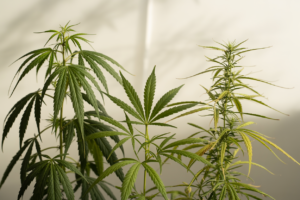- Clinical research findings on marijuana's impact on memory & mental health
Mood and Cognitive Changes from Smoked Cannabis

Contents
Contents
Introduction
As cannabis becomes more legal around the world, many people are curious about how smoking it affects mood and brain function. With millions of users worldwide, it’s important to understand how cannabis impacts memory, focus, and emotions.
This article looks at how smoking cannabis can change mood and thinking abilities, both right after use and later on. We’ll explore how things like THC levels, personal differences, and cannabis strains affect these outcomes. Based on recent research, we aim to share a balanced look at how cannabis affects the brain and mood—important information for health, policy-making, and personal choices. Whether you’re a recreational user, medical patient, or just interested, this article will give you practical insights to help you make informed decisions about cannabis.
Background on Cannabis Use and Its Active Compounds
Cannabis has over 100 active compounds called cannabinoids. The most well-known are THC (tetrahydrocannabinol) and CBD (cannabidiol). These interact with the body’s endocannabinoid system, which helps maintain balance in many body functions.
THC affects mood, memory, and focus, and is what makes people feel “high.” CBD, on the other hand, is more known for its potential health benefits without causing a high. Smoking cannabis quickly delivers THC to the brain.
Different cannabis strains have different THC and CBD levels, which leads to different effects. Other ways to consume cannabis, like vaping or edibles, also change how it affects the body.
Inhalation -> Alveoli in Lungs -> Bloodstream -> Crosses Blood-Brain Barrier -> Brain: Binding to CB1 ReceptorsExplanation of the Pathway
- Inhalation: When cannabis is smoked or vaporized, THC enters the body through the lungs.
- Alveoli in Lungs: The alveoli are tiny air sacs where gas exchange occurs. THC is rapidly absorbed into the bloodstream from these structures.
- Bloodstream: Once in the bloodstream, THC circulates throughout the body, reaching various organs, including the brain.
- Crosses Blood-Brain Barrier: THC is lipid-soluble, allowing it to cross the blood-brain barrier effectively, which protects the brain from harmful substances while permitting certain molecules like THC to enter.
- Binding to CB1 Receptors: In the brain, THC primarily binds to cannabinoid receptors (CB1), part of the endocannabinoid system (ECS), leading to various psychoactive effects.
Acute Effects on Mood Following Smoked Cannabis
Smoking cannabis can quickly change your mood, often within minutes. Many users feel happier, more excited, and more social after use. These effects are strongest about an hour later, as shown by mood tests like the Profile of Mood States (POMS) (see study: ScienceDirect).
Cannabis can also reduce feelings of tiredness, anxiety, or stress, but these effects depend a lot on how much THC is in the strain. High-THC cannabis can cause stronger mood changes and might even lead to anxiety or paranoia, especially in new users.
Everyone responds differently to cannabis. Regular users may not feel the effects as strongly as people who use it less often. The terpene profile of the strain also affects how it changes mood.
Cannabis use can affect emotional control, making positive and negative feelings stronger.
Residual Effects on Mood
The effects of smoked cannabis on mood can last for 24 to 48 hours after use. During this time, users often feel more sociable and in a good mood, especially with high-THC strains. These positive feelings slowly fade over time.
While these leftover effects usually disappear without causing major issues, some users might feel tired or irritable as the positive feelings wear off. Cannabis can also affect sleep, which might change mood the next day.
The lasting effects vary depending on tolerance, usage frequency, and THC levels. Regular users may have fewer lingering effects than occasional users.

Acute Cognitive Effects of Smoked Cannabis
Smoking cannabis can affect how you think, especially in the short term. It can make it harder to remember things, as shown by lower scores on memory tests like the Hopkins Verbal Learning Test-Revised (HVLT-R) (see study: ScienceDirect). Cannabis can also affect focus and reaction time, making people slower on tasks like the Digit Symbol Substitution Test (DSST).
The level of impairment depends on factors like how often a person uses cannabis and their tolerance. Occasional users often have more noticeable effects, while regular users may develop some tolerance. THC levels in the strain also play a big role in how much thinking abilities are affected.
Understanding these short-term impacts is important for activities that require focus and quick responses.
Residual Cognitive Effects After Cannabis Use
After the initial effects subside, some cognitive impacts may linger for a short period.
The lasting effects of smoked cannabis on thinking are usually mild and go away within 24 to 48 hours. Most users don’t have major long-term cognitive issues after this time. Some studies show that small effects on memory, focus, and motor skills may last briefly but are usually not severe (see studies: ScienceDirect, Journal of Clinical Psychopharmacology, Frontiers in Psychology, Wiley Online Library). Interestingly, some tests like the DSST show improvements 48 hours later, possibly due to a rebound effect.
The intensity of these effects depends on THC levels, tolerance, and how often cannabis is used. Occasional users may feel more lasting effects compared to regular users who have built up some tolerance.
These findings are important for understanding how cannabis can affect day-to-day activities and overall brain health.

Mood and Cognitive Performance in Long-Term Cannabis Users
Using cannabis over a long time, especially in large amounts, can have big impacts on mood and thinking. For example, a study published in JAMA Psychiatry found that regular cannabis use can lower IQ and affect learning and memory.
Heavy users may also have trouble with tasks that require planning or decision-making. Long-term use can increase the risk of anxiety or depression, particularly with high-THC strains. CBD might help protect against some negative effects.
Not everyone is affected the same way. Tolerance, genetics, and age when starting cannabis all influence the impact. While some effects may be reversible if use stops, the recovery time can vary.
Mixing cannabis with other substances, like alcohol, can make cognitive issues worse.
Infographic: Long-Term Effects of Cannabis on Cognitive Domains and Mood
Long-Term Cognitive Effects
| Cognitive Domain | Effect | Recovery Potential |
|---|---|---|
| Memory | Impaired short-term memory | Moderate; varies by use frequency and age of onset |
| Attention | Decreased sustained attention | Moderate; improves with abstinence |
| Executive Function | Impaired decision-making | Variable; may improve with time |
| Learning | Challenges in new information retention | Moderate; can recover with cessation |
| Processing Speed | Slower cognitive processing | Variable; may improve over time |
Long-Term Mood Effects
| Mood Domain | Effect | Recovery Potential |
|---|---|---|
| Euphoria | Reduced baseline happiness | Variable; may improve with abstinence |
| Anxiety | Increased anxiety or depressive symptoms | High; often improves after cessation |
| Motivation | Decreased motivation (amotivational syndrome) | Moderate; can improve with lifestyle changes |
| Emotional Regulation | Difficulty managing emotions | Variable; often improves with therapy and abstinence |
Neurobiological Mechanisms Affecting Mood and Cognition
THC, the main psychoactive part of cannabis, interacts with the endocannabinoid system, which helps keep the body balanced. THC mainly binds to CB1 receptors in the brain, which are important for mood, thinking, and memory. This changes how neurotransmitters like dopamine and serotonin work, which affects mood and mental processing.
Brain areas like the hippocampus, prefrontal cortex, and amygdala are most affected by THC, explaining changes in memory and emotions.
CBD can lessen some of THC’s negative effects. Long-term use may cause changes in the brain, especially in younger people whose brains are still developing.

Differences Between THC and CBD on Cognitive Effects
THC and CBD are the main active chemicals in cannabis, and they affect the brain differently. THC is the compound that causes a high and can impair memory, focus, and decision-making. CBD, on the other hand, doesn’t cause a high and might help protect the brain from THC’s negative effects.
High-THC strains are more likely to cause thinking problems, while high-CBD strains offer health benefits without making users feel intoxicated. The balance of THC and CBD in a strain can change its effects, with CBD helping to counteract some of THC’s downsides.
Infographic: Comparison of THC and CBD Effects on Cognitive Functions
| Cognitive Function | THC Effects | CBD Effects | THC Ratio Impact |
|---|---|---|---|
| Memory | Impairs short-term memory | May protect against THC-induced impairment | Higher THC ratios lead to more significant memory impairment |
| Attention | Decreased focus and attention | Minimal impact on attention | Moderate THC ratios can enhance focus in some users |
| Learning | Challenges in learning new information | Supports learning processes | Balanced THC/CBD ratios may facilitate better learning outcomes |
| Executive Function | Impaired decision-making | May improve executive function by reducing anxiety | Higher CBD ratios can mitigate executive function impairment from THC |
| Processing Speed | Slower cognitive processing | Neutral or slightly enhancing | Higher THC ratios can slow processing speed significantly |
Sliding Scale of THC Ratios
- Low THC (1:3): Minimal cognitive impairment; potential for enhanced mood and focus.
- Balanced (1:1): Moderate effects; may support memory and learning while reducing anxiety.
- High THC (3:1): Significant cognitive impairment; increased risk of memory loss and decreased attention.
Summary
The effects of THC and CBD on cognitive functions vary significantly based on their ratios. While higher THC concentrations can lead to impairments in memory, attention, and decision-making, CBD may offer protective effects against these impairments. Understanding the interplay between these cannabinoids can help users tailor their consumption for desired cognitive outcomes.
Factors Influencing Mood and Cognitive Effects
The effects of cannabis vary based on many factors. Age, genetics, and past cannabis use play a big role in how someone responds to THC and CBD. Younger people or those with certain genetic traits might feel stronger effects.
How much and how often cannabis is used also matters. Larger doses or frequent use usually mean stronger effects, although regular users may develop tolerance. How cannabis is used (smoked vs. edibles) also changes its impact. The user’s mood and environment can shape their experience, as well as the strain’s THC and CBD levels. Mixing cannabis with alcohol can make effects worse.
Infographic: Interconnected Factors Influencing Cannabis Effects
Web Diagram Overview
[Genetics]
/ \
/ \
/ \
/ \
[Age] [Sex]
\ /
\ /
\ /
[Mental Health]
/ \
/ \
/ \
/ \
[Dosage] [Consumption Method]
\ /
\ /
\ /
[Environment]
|
[Social Factors]
Brief Explanations for Each Factor
– Genetics: Individual genetic makeup can influence how one metabolizes cannabis, affecting sensitivity to THC and CBD, and overall effects experienced.
– Age: Age can impact the endocannabinoid system’s responsiveness. Younger users may experience different effects compared to older adults due to developmental factors.
– Sex: Biological differences between sexes can lead to variations in how cannabis affects mood, cognition, and physical responses, with research suggesting hormonal influences.
– Mental Health: Pre-existing mental health conditions (e.g., anxiety, depression) can significantly alter the effects of cannabis, potentially exacerbating symptoms or providing relief.
– Dosage: The amount of cannabis consumed plays a crucial role in determining its effects; higher doses of THC are more likely to cause impairments in cognition and mood.
– Consumption Method: Different methods of consumption (smoking, edibles, oils) affect the onset and duration of cannabis effects, influencing user experiences.
– Environment: The setting in which cannabis is used (e.g., social vs. solitary) can shape the experience, impacting mood and cognitive effects.
– Social Factors: Peer influence and social context can modify attitudes toward cannabis use and its perceived effects, affecting both usage patterns and outcomes.
Summary
The effects of cannabis are influenced by a complex interplay of various factors including genetics, age, sex, mental health status, dosage, consumption method, environment, and social dynamics. Understanding these interconnected factors can help users make informed decisions about their cannabis use and anticipate its potential effects.
Frequently Asked Questions
1. Does smoking cannabis affect mood long-term?
Long-term mood changes are more likely with heavy use, but most short-term effects fade with occasional use.
2. How does THC affect short-term memory?
THC can make it harder to remember things right after use.
3. Can smoked cannabis improve mood?
Yes, it often boosts mood and makes people more social, though experiences vary.
4. How do effects differ between occasional and regular cannabis use?
Regular users may build tolerance, which can change both short- and long-term effects.
5. What are CBD’s effects on mood and cognition?
CBD can reduce anxiety and may lessen THC’s negative effects.
6. Are cognitive effects of cannabis use reversible?
Many effects go away after stopping use, but heavy use may cause lasting changes.
7. What factors influence individual responses to cannabis?
Factors include age, genetics, frequency of use, dosage, cannabis strain, and method of consumption.
Conclusion
Smoked cannabis has profound effects on both mood and cognitive function, ranging from short-term mood elevation to potential long-term cognitive changes. The impact varies greatly among individuals, influenced by factors such as genetics, frequency of use, and the potency of the cannabis consumed. While some users experience positive mood effects and potential therapeutic benefits, others may face cognitive challenges, particularly with prolonged use. This variability underscores the importance of informed decision-making and personalized approaches to cannabis use. As research continues to evolve, it’s crucial for users, healthcare providers, and policymakers to stay informed about the complex interplay between cannabis, mood, and cognition. Ultimately, understanding these nuanced effects is key to promoting responsible use and developing effective regulations in an era of increasing cannabis accessibility.
Disclaimer: The information provided in this article is for educational purposes only and should not be taken as medical advice. Consult with a healthcare professional before making any decisions related to cannabis use, especially if you have underlying health conditions or are taking medication.
Subscribe for More Insights: Stay informed about the latest research on cannabis, mood, and cognitive health. Subscribe to our newsletter for regular updates, expert insights, and practical tips on cannabis use.




